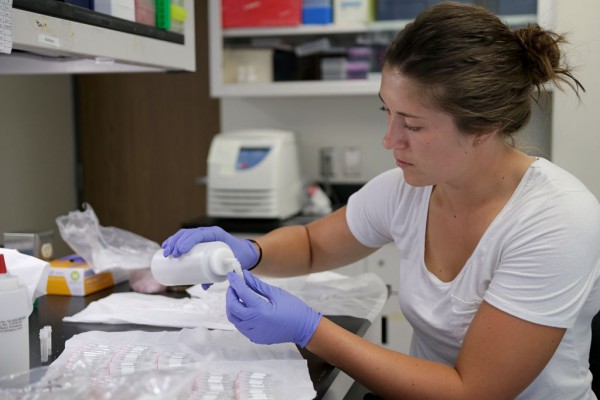 York University's Sarah Laframboise prepares glass vials to be used in the sampling of water across Essex County on Aug. 19, 2017. The biomedical science student and Windsor native is assisting in the sample collection.
York University's Sarah Laframboise prepares glass vials to be used in the sampling of water across Essex County on Aug. 19, 2017. The biomedical science student and Windsor native is assisting in the sample collection.
Researchers from the University of Windsor are seeking citizen scientists to fan out across Essex County and collect water samples for use in measuring harmful E. coli bacteria.
“Right now, it’s commonplace to think that if the E. coli levels are high at area beaches, then the pathogens will be high as well,” explained Subba Rao Chaganti, an adjunct professor at the Great Lakes Institute for Environmental Research. “Very few E. coli strains are harmful, so this project is going to develop tools to detect the actual pathogens that are harmful to humans in a much faster way.”
Members of the public are invited to come out to eight locations across Windsor and Essex County on August 16 to 18 to collect bottles used for the sampling.
On the morning of August 19, those volunteers will collect water samples from across the region and return them to the location where they picked up their bottle.

Sample bottles that will be provided to citizen scientists are pictured in this handout photo.
Dr. Chaganti said samples can be taken from beaches, rivers, creeks or out on the lake. He’s hoping to have about 1,000 volunteers come out to assist the five graduate students working on the project.
“The bottles have a label that the volunteers will write their name, the location they are planning to collect and then the GPS coordinates of where they removed the sample,” Chaganti said. “This has never been done worldwide, and this data will allow us to get a complete spatial map.”
Chaganti said by having numerous samples from the same location, researchers can see if high E. coli counts affect the entire beach or only a small section.
“Current tests by the health unit are taken every week and are posted the next day,” Chaganti said. “But if there’s a big rainfall before or after the test was taken then that scenario would completely change.”

Walkerville high school student Alina Hussey, 16, prepares syringes to be used in the water sampling on August 19.
He said by using a technique that amplifies the DNA and targets specific genes of the pathogen in real-time, researchers at UWindsor can test thousands of samples in only a few hours.
Volunteers can collect their sample bottles from the following locations on August 16 to 18, from 10 a.m. to 4 p.m.
- Belle River’s Lakeview Park West Beach (River Street, Lakeshore)
- Brian Masse constituency office (1398 Ouellette Avenue, Windsor)
- Colchester Beach (100 Jackson Street, Colchester)
- Essex Region Conservation Authority office (360 Fairview Avenue West, Suite 311, Essex)
- Great Lakes Institute for Environmental Research (2990 Riverside Drive West, Windsor)
- Leamington Kinsmen Recreation Complex (249 Sherk Street, Leamington)
*Bottle collection: Thursday and Friday, August 17 and 18, from 4 to 6 p.m. - Point Pelee National Park (1118 Point Pelee Drive, Leamington)
*Bottle collection: Wednesday to Friday, August 16 to 18, from 8 a.m. to 9 p.m.
Once the samples are collected on the morning of August 19, they can be returned between 10 a.m. and noon on the same day.
The LaSalle Freshwater Restoration Ecology Centre (1 Adams Lane, LaSalle) will be open to accept sample returns as well.
Windsor-West MP Brian Masse will host a barbecue for volunteers at his constituency office during the drop-off period.
For more information, please contact Dr. Chaganti at chaganti@uwindsor.ca.
